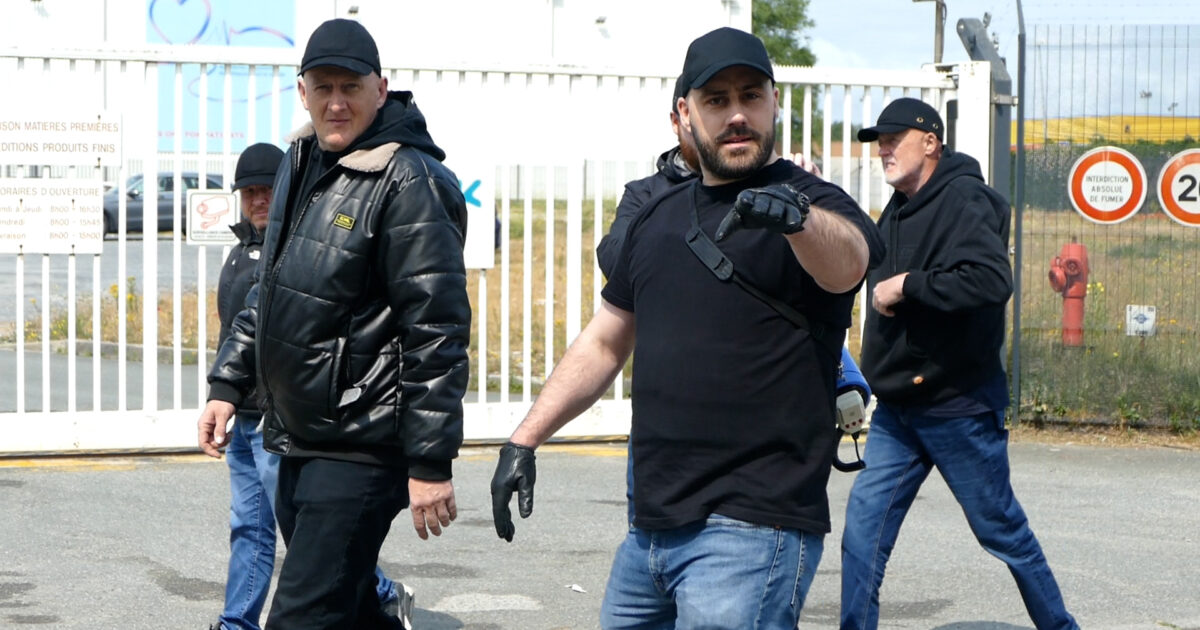British far-right thugs harassing migrants in northern France are being encouraged by mainstream politicians’ increasingly dehumanising rhetoric, aid workers have told Novara Media.
Faced with daily police violence and no safe route to the UK, migrants living in refugee camps in northern France have more than enough to worry about. But just to make things even worse, last week far-right troublemaker Nick Tenconi turned up with a mob of activists who filmed themselves intimidating migrants and aid workers for a self-promotional video.
Wearing black leather gloves, a stab vest and wielding a megaphone, Tenconi is seen goading aid workers by calling them “communists”, “Nazis” and “terrorists”, and tells viewers that leftists are “architects in the subversion of British culture and Christianity”.
Tenconi, who is 41 years old, gets exasperated when aid workers won’t “rationalise” with his arguments before telling them to “go win a war”. This was then packaged as a promotional video for Ukip, ending with a plea for money for this “vital work”.
Ukip’s national chairman Ben Walker has set up a crowdfunding page asking the public to donate £50,000 to support “a crucial initiative” to “secure our borders”. Making a sinister – and almost certainly fabricated – claim that the party had just “conducted its first operation… collaborating with French police to locate and stop small boats from crossing the channel”, the fundraiser asked for donations in order to “maintain designated teams on rotas in the North of France, working tirelessly to prevent the dangerous and illegal crossing of our borders.”
Tenconi is leader of Ukip and far-right group Turning Point UK (TPUK). TPUK was behind a series of protests against drag performances in south London pubs in 2023. Last year, Novara Media reported how TPUK was a key force organising far-right action against leftwingers and Palestine protests, sometimes descending into disorder, while attempting to maintain links with leading figures in the Conservative party. Its honorary president, Marco Longhi, has since defected from the Tories to Reform.
Among Tenconi’s mob in Calais was Callum Smiles, a self-styled journalist who has worked with far-right news channel Rebel News.
Aid workers told Novara Media that migrants already face brutality from the French police and that far-right activists are merely “adding fuel to the fire”. Lachlan Macrae from the Calais food collective said: “The reality of life for refugees here in Calais is kept deliberately brutal and hostile by both British and French government policy.
“Refugees here are subject to near daily evictions from their living sites; their tents, belongings, phones and personal items including money are stolen regularly.”
Macrae blamed mainstream political rhetoric on migration for encouraging far-right intimidation.
“‘Small boats’ is always just talked about as some sort of political football, rather than actually the reality here. And the reality is cruelty, the reality is human rights abuse, and there’s no serious conversations about this stuff.
“It’s inevitable that you’re going to get more of these fascist activists coming out here, when you have the entirety of the British mainstream political spectrum considering these people a national security threat rather than what they are, which is desperate people needing support.”
Tenconi’s claim of working with the French police appears to be a fantasy. “When I saw Tenconi walking about with his fascist mob, they were clearly just a bunch of goons. There was no collaboration with the French authorities,” said Macrae.
But the reality isn’t much better. The state is already repressing migrants and far-right visits are happening “more and more”, said Macrae. “What you see is the result of the politics that happen when you’ve got a prime minister echoing Enoch Powell.”
Macrae said that Tenconi, “threatened to report my face to the British authorities. I mean, that tells you all you need to know about where the Labor party is when it comes to this issue.”
A winning strategy
Tenconi is very concerned about the wrong sort of people being let into the country. Speaking of the wrong sort of people, as they are Ukip campaigning materials, the videos were promoted by chairman and cowboy builder Walker. In 2019, Walker was found guilty of five breaches of building regulations at Bristol Magistrates Court and ordered to pay more than £11,000.
He then applied to be a justice of the peace and failed to disclose his convictions. In February 2024 the Judicial Conduct Investigations Office announced that he had been removed from the bench. Walker apologised saying he did not think that the matter for which he was fined amounted to a conviction, therefore, did not need to declare it.
On Wednesday, Walker stood in a council byelection in the Severn ward in Stroud.
In a candidate statement to local media he called himself a “public servant” without mentioning the justice of the peace affair and claimed: “I would be elected to serve you and not a political party … I won’t sell you empty promises or nationally focused policies. I will however offer you service and loyalty.” This is an interesting set of promises from a guy who spends his time promoting far-right propaganda and funding for vigilantism as the chairman of a political party.
The voters of Stroud were not convinced. In a closely fought election, the Green party candidate Moya Shannon won with 439 votes, beating the Conservatives and Reform by just a handful of votes each. Walker duly came last with just five votes.
Ukip has been approached for comment.
Simon Childs is a commissioning editor and reporter for Novara Media.
